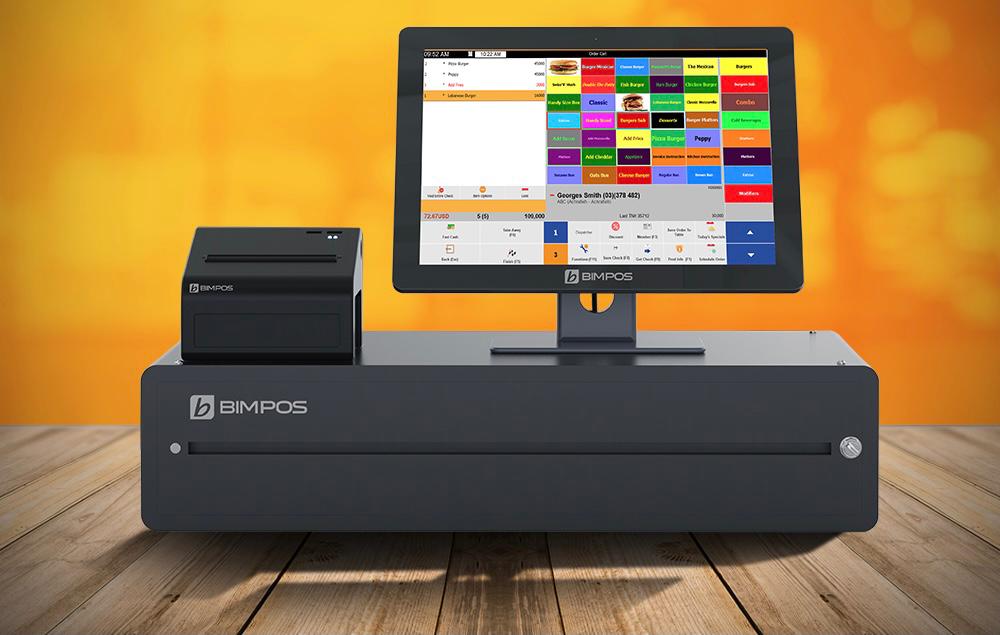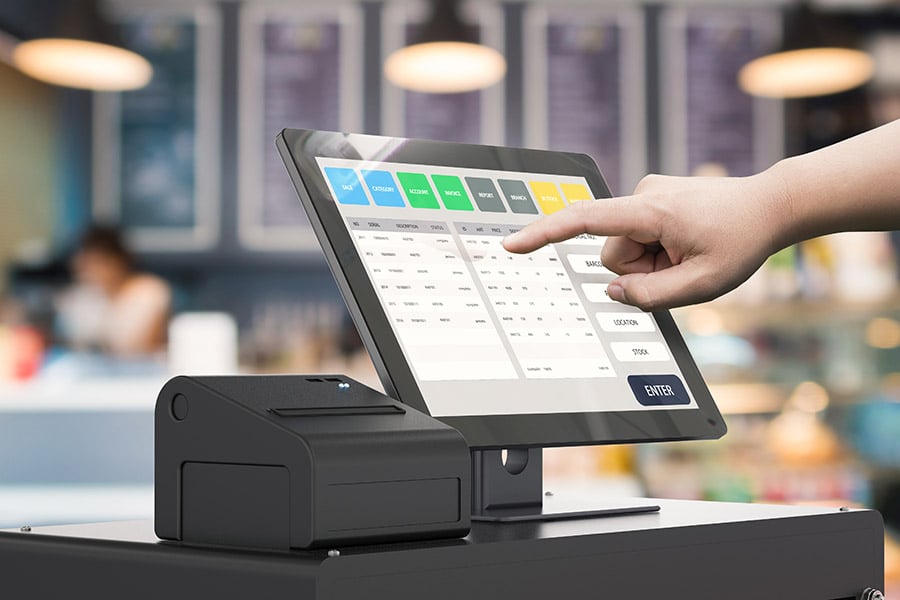The 10-Minute Rule for Pos Machine
The 10-Minute Rule for Pos Machine
Blog Article
4 Simple Techniques For Pos

POS Machine: Retail Point-Of-Sale Solutions Streamline Deals
The 15-Second Trick For Point Of Sale

Hardware Parts of a Point of Sale System What makes a POS system tick? It's not just software; the hardware plays a starring role. Consider it as the body to the software application's brain. Without the best hardware, even the most advanced POS software is just a quite face. Vital POS Hardware So, what are the must-haves? Let's break it down. The central processing unit, frequently a computer system or tablet, is the heart of the operation. The monitor or touchscreen display enables personnel to connect with the system. A barcode scanner speeds up the checkout process. Remember the days of by hand getting in each code? The dependable receipt printer provides clients with a record of their purchase. A money drawer keeps your money safe and organized. A card reader enables clients to pay with credit or debit cards. Diving Deeper: Beyond the Fundamentals But wait, there's more! Depending upon your company, you might require customized hardware. For instance, a dining establishment might include cooking area printers to relay orders, while a retail store might utilize label printers for item tagging. Ever wonder how your regional bakeshop instantly prints those delicious-looking labels? Selecting the Right Hardware: A Balancing Act Choosing the best hardware isn't practically purchasing the most pricey devices. It has to do with finding the sweet website area in between functionality, sturdiness, and budget. A small company just beginning out may go with a more basic setup, while a high-volume seller will require robust, high-performance devices. Is it much better to buy brand-new or used? Consider your choices thoroughly. A new system provides the newest technology and warranty defense, however a refurbished system can save you cash. The Future of POS Hardware What does the future hold? Expect to see much more integration with mobile phones, biometric scanners for employee authentication, and advanced analytics control panels displayed on larger, clearer screens. Imagine a world where inventory is instantly updated in real-time as products are scanned-- a world where you can track your very popular item from throughout the world. The possibilities are limitless, and the hardware is continually progressing to meet the needs these days's organizations. Are you ready to upgrade your point of sale system?
Software Application Characteristics and Capabilities: The Heart of Your POS System
Ever watch a skilled barista slide through a hectic early morning rush? Their trick isn't simply caffeine; it's a seamless dance with their POS system. The software is the conductor of your business symphony, orchestrating everything from sales to inventory. What notes should you be listening for? What capabilities truly matter in today's market?
Inventory Management: Beyond Counting Beans
Forget spreadsheets that haunt your dreams. Modern POS systems offer real-time inventory tracking, alerting you when your stock of artisanal coffee beans dips precariously low. Consider it as a digital guardian angel, preventing those awkward "Sorry, we're out!" moments to consumers. What if you could also anticipate need based upon historic data? Numerous systems now provide forecasting tools, an effective weapon versus overstocking and lost sales. This helps prevent the predicament of running out of popular items or building up excess stock of slow-moving items, both of which can constrain capital and space.
Sales Reporting and Analytics: Deciphering the Information
Sales information is the brand-new gold, and your POS system is the miner. Forget simply knowing how much you sold today. Dive deep into the information to uncover patterns, determine your very popular products, and comprehend customer behavior. Which menu item pairs perfectly with the everyday special? Which promotion resonated most with your customers? These insights are not simply interesting; they're actionable intelligence. Without dependable sales reporting, navigating the complexities of service decision-making ends up being like sailing without a compass, increasing the opportunity of bad moves and missed out on opportunities.
Client Relationship Management (CRM): Structure Bridges, Not Walls
Remembering a routine customer's name and favorite order is captivating, but scaling that personal touch is challenging. POS systems with CRM abilities permit you to track client purchase history, preferences, and even birthdays. Imagine immediately offering a discount rate on their birthday-- a little gesture that fosters commitment and motivates repeat service. There is the potential snag of bad data quality, which can lead to unreliable client profiles and ineffective marketing efforts.
Payment Processing: Enhancing the Deal
The checkout experience can make or break a sale. Seamless integration with numerous payment methods-- credit cards, mobile wallets, even copyright-- is non-negotiable. Can your system deal with split payments? Does it offer safe and secure tokenization to protect customer data? A cumbersome payment procedure is like striking a sour note in your service symphony, potentially disrupting the entire efficiency. Guaranteeing compatibility with developing payment technologies and adherence to security requirements are vital for maintaining client trust and functional performance.
Employee Management: Keeping the Team in Sync
From clocking in and out to handling permissions and tracking efficiency, staff member management features simplify operations and enhance responsibility. Is scheduling a problem? Lots of POS systems provide integrated scheduling tools, optimizing staffing levels based upon forecasted need. A typical barrier that is frequently overlooked is the challenge of integrating employee management performances with payroll systems, which can cause mistakes and ineffectiveness in wage calculations.
Advanced Characteristics: Leveling Up Your Operations
- Table Management: Suitable for dining establishments, this feature allows you to visualize your dining space, track table status, and manage reservations.
- Commitment Programs: Reward your best customers and encourage repeat business with incorporated commitment programs.
- Online Buying Combination: Seamlessly integrate your POS system with online buying platforms to broaden your reach.
Choosing the best POS system has to do with more than just functionality; it has to do with discovering a partner that can grow with your organization. Consider your present needs, anticipate future development, and do not be scared to ask the hard concerns. The best software can change your company from a disorderly cacophony into an unified work of art.
Industry-Specific POS System Applications
Consider the regional bakery, dynamic with morning consumers yearning fresh croissants. A generic POS system might handle deals, but can it manage complex dishes, track active ingredient inventory, or automatically adjust production schedules based upon sales information? Probably not. That is where the charm of industry-specific POS systems shines.
Restaurants and Hospitality
For busy restaurants, speed and precision are vital. How many times have you seen servers juggling orders, modifications, and splitting costs, all while attempting to offer outstanding service? A dining establishment POS system improves these processes, enabling table management, kitchen order tickets, and even online buying integration. These systems frequently include features like ingredient-level inventory tracking, essential for managing food costs and reducing waste. Ever wonder why your preferred dish is sometimes not available? It may originate from a lack of proper stock management.
- Table Management
- Kitchen Order Tickets
- Online Purchasing Combination
- Ingredient-Level Inventory Tracking
Retail Solutions
Retail, with its diverse inventory and customer interactions, demands a various set of tools. Envision a boutique clothing store struggling to track sizes, colors, and seasonal collections utilizing a basic checkout system. An industry-specific retail POS system provides features like barcode scanning, consumer commitment programs, and detailed sales reporting. These systems can even integrate with e-commerce platforms, providing a smooth omnichannel experience for clients. Did you understand some retail POS systems can predict future sales patterns based on historical data? Now that is powerful!
The Hazards of a Mismatch
Selecting the wrong POS system can create significant operational difficulties. A clothing shop using a dining establishment POS, for example, would find it unsuitable for handling inventory with sizes and colors. The lack of correct reporting and analytics might result in misinformed getting choices and lost income. The result might be comparable to attempting to fit a square peg in a round hole.
Secret Factors to consider
Picking an industry-specific POS system requires careful examination. Believe about your organization's distinct requirements and functional workflows. Does the system integrate with existing software application? Does it offer the essential reporting abilities? Is it scalable to accommodate future growth? A well-chosen POS system is not just a deal tool; it's a strategic possession that can drive performance, enhance customer fulfillment, and ultimately, improve your bottom line. Keep in mind, it is a financial investment in your business's future, not just an expenditure.
Security Considerations for Point of Sale Systems
Ever heard the tale of the mom-and-pop shop that lost everything due to the fact that of a single, neglected security defect in their POS system!.?. !? It's a cautionary tale, and it highlights a critical aspect often eclipsed by the attraction of elegant functions and streamlined operations. The reality is, a POS system is only as great as its security. What great is a system that crunches numbers in a flash if it enables wrongdoers to swipe customer's data just as rapidly?
The Vulnerability Minefield
The digital landscape is a battleground. Every POS system, no matter size or sophistication, is a prospective target. Are you truly got ready for the threats prowling around the corner? The genuine pinch comes when you discover that your out-of-date software has a gaping hole that hackers can exploit, turning your business into an unwitting accomplice in identity theft. The difficulty is that hackers are crafty and are constantly changing their strategies.
Typical Security Gaps and Expert Tips
- Weak Passwords: "Password123" isn't sufficing. Use strong, special passwords for all POS system accounts and alter them routinely. Two-factor authentication is a must.
- Unsecured Networks: Your Wi-Fi resembles leaving the front door open. Protect your network with strong encryption (WPA3 if possible) and consider a separate network for your POS system.
- Outdated Software: Software suppliers patch security holes all the time. Failing to upgrade is like welcoming trouble. Establish automated updates or schedule regular upkeep.
- Employee Training: Your staff is your first line of defense. Train them to acknowledge phishing attempts, safeguard passwords, and report suspicious activity.
Data File Encryption: Your Guard Against the Dark Arts
Think about information file encryption as a secret code. It scrambles sensitive details, like credit card numbers, making it unreadable to unauthorized users. Without encryption, your consumers' financial details resemble sitting ducks, ripe for the picking by cybercriminals. It's not almost safeguarding your clients; it has to do with safeguarding your track record and avoiding hefty fines.
PCI Compliance: The Rulebook You Can't Disregard
If you accept credit cards, you're bound by the Payment Card Market Data Security Standard (PCI DSS) It's a set of security requirements created to secure cardholder data. Failing to comply can result in fines, charges, and even the loss of your ability to process credit card payments. It's a headache, yes, but it's an essential one. Think about PCI compliance as the cost of doing service in the digital age.
Consider this: every deal processed through your point of sale is a potential entry point for malicious actors. By carrying out robust security procedures, you're not simply securing your company; you're safeguarding your customers' trust and making sure the long-term viability of your operations. The security of your POS system isn't just a technical concern; it's an organization vital. It requires consistent alertness, proactive steps, and a commitment to remaining ahead of the curve.